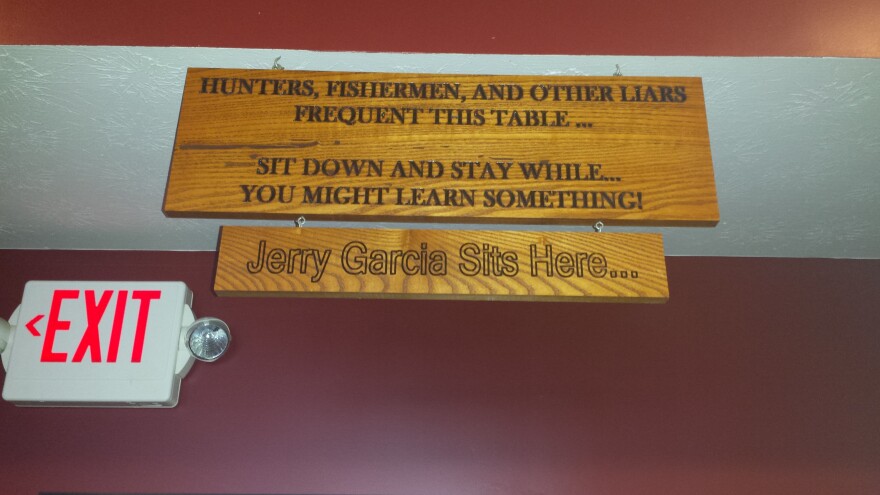The term Liar’s Club dates back to the late 1800’s. It describes small groups of friends, usually men, who get together at local pubs, coffee shops, and restaurants to hang out and gossip about the local community, and discuss world events.
Producer Renee Wilde met with a group of retired farmers at their local liars table at Beans-n-Cream in Cedarville, Ohio.
The sign above the table says, Hunters, fishermen and other liars frequent this table. Sit down and stay awhile, you might learn something.

A local farmer, sipping coffee and reading the paper under the sign, lets me join his table. His name is Mark and when I ask him what kind of things he and his group of friends talk about at this table.
With a slow draw, the 71 year old says “We talk about whatever. We might talk about sports. We might talk about politics. We might talk about farming. We might talk about the mistake the neighbor made in his field and broke down some equipment, or has a crop problem in a field.”
With a sly grin Mark adds, “But, if I might talk about my neighbor’s problem, I got problems that they might talk about also.”
We’re soon joined by another farmer named Paul, also in his 70’s. Paul was a sales manager for Pioneer Seed Corn in South West Ohio, and now has a small farm out in the country, cow/calf operation.
Reflecting back on his time selling seed corn, Paul says, “Back in the ‘70’s and ‘80’s we used to figure that we lost 10% of our growers every year. That they would just get out of farming. They couldn’t expand and make money. Farm equipment got so expensive that the small farmer couldn’t compete”
He adds that, “You either got big or got out. And that was pretty much the trend and it’s getting more that way all the time. You don’t see new farmers coming in and buying land. You see ‘em consolidating farms. Putting ‘em all together.”
Denny and Mike join the group, and the topic of conversation turns to guns.
“Shooting yourself in the foot, or shooting your mouth off,” jokes Mike.
Denny is a little more serious. He wants me to know that he is a card carrying life member of the NRA.
Denny goes to the range about three days a week, sometimes four, and he says, “ Most people, what they know about guns, you could put on a lead pencil. The sharp end."
Paul chimes in, “You see on the news that they say, ‘well, he had five guns in the house and over 500 rounds of ammunition, and it sounds like ‘oh, he’s a terrorist’, and I have over that in my house.”
When I ask if he is serious, Paul laughs and says, “I just have ‘em. I inherited ‘em.”
Guns aren’t the only hot-button topic in the group. When I ask Dean, another local farmer whose just sat down at the table, what he wants other people to know about farming he is quick to come back.
“A certain segment of our society tries to give give commercial agriculture a black eye,” Dean says. “ They say that we don’t give a blankety blank about the environment. BALONEY!”
Dean adds, “Farmers are the best environmentalists that have ever been on this earth. You don’t want to destroy the soil and the land and the water. You want to preserve it.”
Like many of the farmers sitting at this table, Dean can trace his families ties to this region going back over one hundred years.
“My ancestors came to Greene County in 1829, from Rockbridge County Virginia”, Dean tells me proudly.
Dean’s grandchildren are the 7th generation to work the family farm. He says that farming is a big gamble.
Dean explains, “This past year is an example, and at two hundred bushels per acre, actual yield, with the cost of putting out a serious acre of corn on a commercial basis, you lose about thirty dollars and acre.”
Dean reflects back on the early 1980’s when Ronald Reagan addressed the annual FFA convention. He remembers Reagan’s speech to the young group of future farmers assembled.
He quotes the speech, "what you and your families do for a living makes a crap table in Las Vegas look like a sure thing."
Dean says he has never forgotten that. He shakes his head and tells me, “Well that’s where we are at this moment. You work yourself to a frazzle and maybe you’ll make it and maybe you won’t.”
Then Dean smiles and adds “You know we’re like the Brooklyn Dodgers used to be back in the ‘50’s when they hadn’t never won a pennant. Wait till next year!”
County Lines is WYSO’s series focusing on small towns and rural communities in the Miami Valley and beyond. Community Voices producer Renee Wilde travels down the highways and back roads to bring WYSO listeners stories of country life that go beyond the stereotypes. County Lines is made possible by a generous grant from Ohio Humanities.



